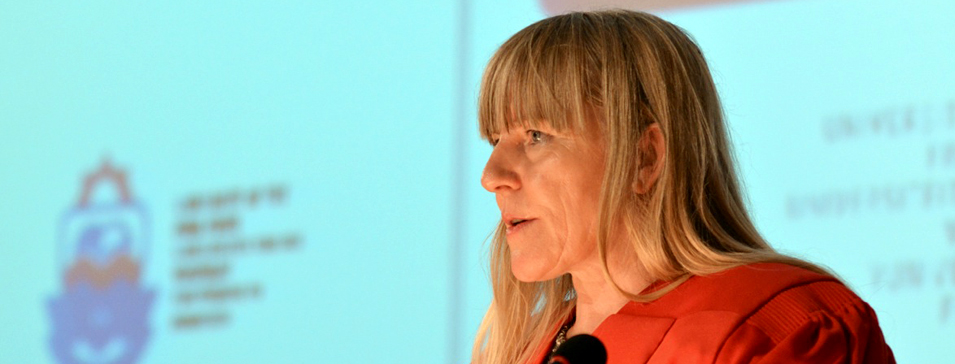Latest News Archive
Please select Category, Year, and then Month to display items
02 January 2025
|
Story Gerda-Marie van Rooyen
|
Photo Supplied
 Leading the research in South Africa is Prof Linus Franke from the Department of Soil, Crop and Climate Sciences.
Leading the research in South Africa is Prof Linus Franke from the Department of Soil, Crop and Climate Sciences.
Scientists are actively pursuing the successful breeding of diploid hybrid potatoes from inbred lines. This is expected to revolutionise potato breeding as it holds the key to rapid genetic progress. It will introduce new varieties for commercialisation through seed. Currently, existing potato variants have a gene that renders self-pollinated seeds infertile.
Prof Linus Franke, an academic in the Department of Soil, Crop and Climate Sciences at the UFS, is leading the research in South Africa. “This technology allows the production of genetically uniform potato seed that is easy to transport and largely disease-free.” He says this differs from conventional breeding whereby only vegetative propagation is possible due to tetraploid varieties in potatoes. It also risks carrying pests and diseases from one generation to the next – leading to the accumulation of pests and diseases with each round of multiplication.
Seed innovation
Prof Franke explains that Solynta BV, a seed company based in the Netherlands that produces potato varieties that can be grown from seed, has included South Africa in their research efforts because it is one of Africa’s largest producers and exporters. Through his academic relationship with Wageningen University and Research, a Dutch institution renowned for its agricultural endeavours and food production, the UFS became involved in researching hybrid potatoes grown from seed.
Diploid seeds containing two sets of chromosomes allow easier gene manipulation to increase predictability and speedier genetic progress. The breeding approach enables the incorporation of tolerance to pests, diseases, abiotic stresses (cold, heat, drought) and other desired genetic traits.
Although Prof Franke is optimistic about this research, he is not blind to disadvantages. “Potato seeds are tiny and have little energy reserves, making it harder to grow potatoes from seed than from tubers.” He says potatoes from seed will take longer to cultivate than tubers, as farmers need to grow plantlets from seeds first, adding six weeks to the growing period. “It is possible that commercial farmers can grow potatoes directly from seed. Alternatively, perhaps more likely, specialised growers will produce tubers of potatoes from seed; these tubers are then sold as seed tubers to other potato farmers, who then continue their normal practices of producing potatoes for the market from tubers.”
Financial benefits
Prof Franke says farmers have reason to get excited. “Seed potatoes will reduce input costs, as varieties with enhanced tolerance to pests and diseases require less pesticides. Planting one hectare of potatoes requires three to four tonnes of potato tubers, but only one 25 g packet of potato seeds.” Since potatoes are a more valuable commodity than maize, this technology might also increase farmers’ income potential.
Prof Annie van den Oever envisions the future of film and visual media in her inaugural lecture
2014-02-07

The university formally welcomed Prof Annie van den Oever, an internationally-recognised film and media scholar, within its academic ranks. Her association with the UFS forms part of an exciting new postgraduate programme in film and visual media being created by the Faculty of the Humanities.
Prof Annie van den Oever delivered her inaugural lecture, “Foundational Questions for a Film and Visual Media Programme”, sharing her extensive knowledge in the field. The lecture attracted an international audience with people following the talk via live streaming from places such as Oslo, Berlin and London.
“Annie is quite a connected person through the film and visual media world,” Prof Lucius Botes, Dean of the Faculty of the Humanities, told the audience in the CR Swart Auditorium. He also referred to the fact that, under the auspices of Prof Van den Oever, two staff members from the faculty completed their master’s degrees at the University Groningen where she also teaches. “I am happy to announce that through Annie’s network we can invest in these young people.”
Prof Suzanne Human, Head of the Department History of Art, applauded the senior leadership for its vision to appoint Prof Van den Oever as extraordinary professor. “We have profoundly benefited and will still benefit from Annie’s obvious enjoyment in sharing her considerable experience and expertise in the design of a programme of film and media studies.”
The new postgraduate programme in film and visual media is being developed in partnership with the departments of Art History and Visual Culture Studies, Drama and Theatre Arts, English and the Department of Afrikaans, Dutch, German and French. The university aims to have the first film students enrol in 2015.